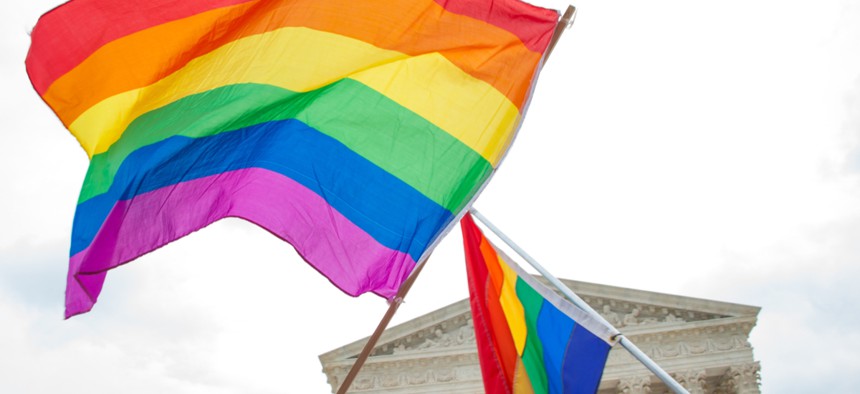D.C. City Council Considers End to ‘Gay Panic’ Legal Defense

Two bills in D.C., introduced by Councilmembers Phil Mendelson and David Grosso, each aim to ban the LGBTQ panic defense. Shutterstock
Two bills would prohibit a legal defense for murders or attacks that relies on what many consider to be a discriminatory view of the LGBTQ community.
LGBTQ people, particularly transgender women, are subject to higher rates of violence than heterosexual people. This violence is usually committed by heterosexual men, who afterwards have sometimes relied on a legal defense strategy for attacks and murders known as “gay panic” or “transgender panic,” in which they claim that the victim’s identity provoked the attack.
The defense has been banned in several states, starting with California in 2014, with Illinois and Rhode Island soon following. But this year has seen the greatest surge of action, as Nevada, Connecticut, Maine, Hawaii, and New York all passed laws to eliminate the legal practice. Now, Washington, D.C. may become the next jurisdiction to prevent accused murderers from evoking a panic defense.
Two bills, introduced by Councilmembers Phil Mendelson and David Grosso, each aim to ban the LGBTQ panic defense. “We as a government must do all that we can to protect populations whose very existence can be taken advantage of,” Mendelson said in a press release. “It is unacceptable for bigots to claim panic as a defense, as if the victim was at fault for the bias-related crime.”
Gay panic defense arose as a legal strategy in the 1960s, and have three main forms. A defendant may argue that they were rendered “temporarily insane” by the revelation that their victim is LGBTQ, based on a since-debunked theory of “gay panic disorder.” A defendant may also argue that they were defending themselves against a non-violent sexual advance that provoked them to attack or kill the victim. One of the less common strategies cites self defense, in which a defendant argues that they believe the victim’s sexual orientation or gender identity posed an imminent physical threat.
Though the defense may seem antiquated, it has been evoked in the District as recently as 2008, and has been successfully used in dozens of cases across the country in the past two decades. Grosso said his bill is necessary now because of the “heightened rhetoric of hate and violence” that he has noticed. “A defense that exploits bias simply should not be acceptable,” he said in a statement. “This bill is not limited to LGBT victims, but also covers any situation where an individual might seek to excuse their violent actions on the basis of another person’s identity.”
Grosso’s bill is more wide-reaching than Mendelson’s, which only covers LGBTQ victims, but the added identity categories may not be necessary. According to the LGBTQ Bar, panic defenses are uniquely used against LGBTQ individuals. “While other minority groups are undoubtedly also victims of hate crimes, there are few, if any, instances where a defendant claims that the revelation of someone’s race, religion, or other minority identification provoked them to violence,” reads an explanation of the legal strategy on the group’s website.
But criminal defense lawyers often object to limiting their options in representing a client accused of a serious crime, saying they have a constitutional right to defend themselves. In a statement, the National Association of Criminal Defense Lawyers said that the “tragic circumstances of many cases justifiably give rise to a public outcry” and spur oversimplified categorical bans.
“Sympathy for victims of crime targeted because they are vulnerable, oppressed, or marginalized often leads to important and meaningful community advocacy to legislate policy changes that protect and make life safer for members of these groups,” the statement reads. “Categorically prohibiting defenses through legislation may feel like a meaningful solution in the aftermath of a high-profile crime, but it is a misguided impulse. These laws dramatically impinge on accused persons’ rights to confront their accusers and mount a defense.”
Advocates in the LGBTQ community vehemently disagree, and say that as violence is a continuing problem, the strategy must be retired.
In an announcement about his bill, Grosso said that the defense has been used in particular by individuals who attack or murder transgender women, and then claim that their identity is a form of “deception” and therefore “justified a violent response.” This happened in the case of Bella Evangelista, a transgender woman and sex worker in D.C. who was killed by a client in 2003. Grosso’s bill is co-named for Evangelista and Tony Hunter, a gay man killed in 2008 whose murderer also evoked a gay panic defense.
Gillian Branstetter, the spokesperson for the National Center for Transgender Equality, said that trans women can be particularly vulnerable to violent attacks. She noted that two trans women, Zoe Spears and Ashanti Carmon, have been killed in recent months in Maryland, very close to the border of D.C. and just blocks away from one another. At least 19 transgender people have been killed in 2019, and most are black transgender women.
Branstetter said that the District is now taking an important step to recognize the “faulty legal and psychological reasoning” behind the defense, while also “making it clear that the trans panic defense is transphobia in its purest form.”
“The trans panic defense solidifies the notion that we are not who we say we are and are defrauding everyone else,” she said. “It’s a mentality that not only enables violence but also enables large scale policy disenfranchisement of trans people.”
Emma Coleman is the assistant editor for Route Fifty.
NEXT STORY: Georgia Accepting Online Applications for Open Senate Seat






